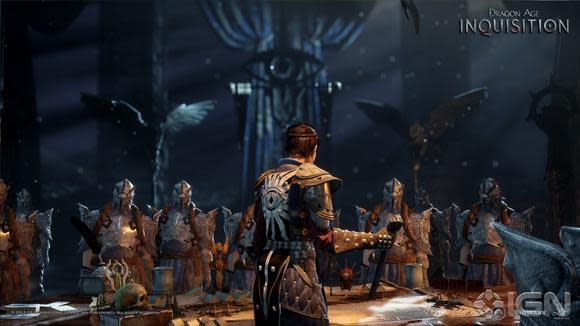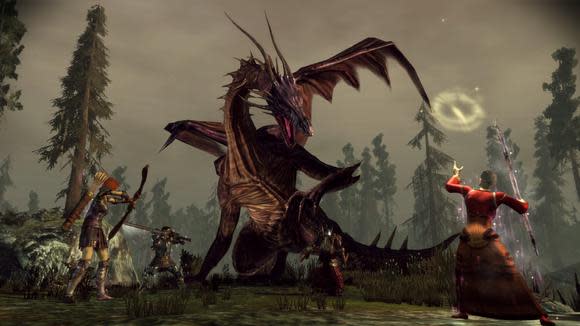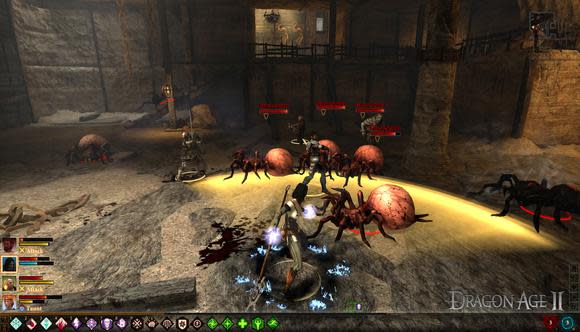Dragon Age: Inquisition - BioWare Must Get These 3 Things Right
Electronic Arts' BioWare studio recently released an update regarding Dragon Age: Inquisition, the eagerly awaited third installment of its popular Dragon Age franchise.
According to the update, a new build of Dragon Age: Inquisition is finished, and the main storyline is now playable from start to finish. BioWare has also started to add music and voiceovers to the game, and is polishing up the combat mechanics for each class.
Inquisition will be released in Fall 2014 in North America for the PC, Sony's PS3 and PS4, and Microsoft's Xbox 360 and Xbox One.

Dragon Age: Inquisition. Source: Ign.com
Let's take a look back at sales of the original title, Dragon Age: Origins, its expansion pack, Dragon Age: Origins: Awakening, and Dragon Age II to better understand what Dragon Age: Inquisition means for Electronic Arts.
Game | Platforms | Total units sold | Metascore (PC) |
Dragon Age: Origins (2009) | PC, PS3, Xbox 360 | 4.41 million | 92 |
Dragon Age: Origins: Awakening (2010) | PC, PS3, Xbox 360 | 0.73 million | 82 |
Dragon Age II (2011) | PC, PS3, Xbox 360 | 2.20 million | 82 |
Sources: Metacritic, Vgchartz.com, excludes sales of DLC.
Dragon Age: Origins was the most critically acclaimed and best-selling title of the series, and for good reason. The first title took over five years to develop, and was started well before BioWare was acquired by EA in 2007.

Dragon Age: Origins. Source: BioWare.
Dragon Age II, by comparison, was developed in less than two years. With a lower critical response and sales totaling less than half the sales of the original game, it's clear that its shorter development cycle took a notable toll.
Now, as gamers get their first glimpse of Dragon Age: Inquisitions, let's consider three key things that BioWare must get right for the franchise to get back on the right track.
1. What's the rush?
If Dragon Age: Inquisition is released on time, it will have spent over three years in development. Hopefully, that suggests that EA and BioWare have learned from the mistakes it made rushing Dragon Age II out the door.
The most common complaint about Dragon Age II is the glaring use of recycled environments. Whereas Dragon Age: Origins featured a wide open, Tolkien-inspired world with various towns and cities, gameplay in Dragon Age II was mostly restricted to one large city.
This meant gamers ran back and forth across the same areas repeatedly. To make matters worse, many of the outdoor and indoor stages were reused for different missions, which meant that the map stayed the same while the enemies and NPCs (non-player characters) were simply swapped out. Instead of spending more time creating new areas for gamers to explore, BioWare decided to take the faster, cheaper approach by simply coding in a few more quests.

Dragon Age II. Source: BioWare.
While this might have been expected from other studios, BioWare had built its reputation on polished, painstakingly crafted games like Star Wars: Knights of the Old Republic, Jade Empire, Mass Effect, and Dragon Age: Origins.
Dragon Age II was the first time that BioWare truly disappointed gamers -- a fact that EA Games Label President Frank Gibeau once acknowledged in an interview with GameRant.com.
"As we think about where we take the franchise next," Gibeau stated, "we're going to take that into consideration and really engage them." Gibeau acknowledged that while Dragon Age II gained some new fans, it had lost many fans as well.
Let's do the math and analyze the possible cost of rushing Dragon Age: Inquisition to the market. Assuming that Dragon Age: Inquisition retails for $60 and sells 2.2 million to 4.5 million copies, it could generate $132 million to $268 million in revenue for EA in fiscal 2015 (EA's fiscal 2014 ends on June 30, 2013).
Based on EA's 2013 revenue of $3.8 billion, Inquisition could represent up to 7% of the company's top line. Therefore, EA could put BioWare under considerable pressure to get the game to the market as soon as possible.
However, EA should remember that it lost over half of its core audience with Dragon Age II.
2. Retaining the improvements made in Dragon Age II
Although it would be tempting to "go back to the basics" of Dragon Age: Origins and pretend that Dragon Age II never happened, BioWare should also acknowledge the improvements that Dragon Age II brought to the franchise.
Dragon Age II offered a considerably improved user interface, better combat gameplay, a cleaner art style, and a more interesting story than its predecessor.

Dragon Age II's combat system is a vast improvement over its predecessor. Source: BioWare.
By comparison, Dragon Age: Origins' inventory system was cluttered with unnecessary items, the combat was occasionally clumsy, and the story was a cliche high fantasy tale of uniting multiple races against an ancient evil. Gamers, however, overlooked a lot of these problems thanks to the sub-quests and rich, branching story line possibilities that led to different outcomes at the end of the game.
Another huge improvement that Dragon Age II made came directly from Mass Effect's "conversation wheel," in which the gamer picked a short response and watched his or her character act out the choice through fully voiced lines. The hero or heroine in Dragon Age: Origins, by comparison, remained mute during conversation scenes.
In other words, Dragon Age II was a beautifully produced but ultimately shallow game. Hopefully, BioWare will retain some of these improvements while making Inquisition a longer, deeper game.
3. Choices that matter
Last but not least, BioWare needs to give the player choices that matter in Dragon Age: Inquisition.
BioWare's seminal RPG, Star Wars: Knights of the Old Republic, was a major hit because it gave the player a choice to either embrace the dark side or resist it. The Mass Effect trilogy ended with the player deciding to help synthetic beings or to wipe them out. Dragon Age: Origins concluded with the player either deciding to sacrifice himself or another character to kill the Archdemon.
Meanwhile, Dragon Age II gave the player a choice to side with the freedom-seeking mages or the mage-watching Templars. Unfortunately, the end of Dragon Age II completely nullified any pro-mage or pro-Templar choices made throughout the game by forcing the player to kill the leaders of both factions in the end. In other words, none of the subtle choices the player was asked to make throughout the game really mattered.

"Choice? What choice?": Dragon Age II's controversial endgame. Source: Dragonage.wikia.com
In other words, Dragon Age II was a digital Choose Your Own Adventure Book, where all the pages led to a single identical ending.
Hopefully, BioWare realizes that the freedom of choice leads to higher replay value -- one of the main reasons that gamers love their games.
A final thought
In closing, the future of the Dragon Age franchise hinges on the success of Dragon Age: Inquisition.
If BioWare drops the ball again as it did with Dragon Age II, this once promising franchise could come to an abrupt, premature end. But if BioWare draws upon the strengths of the first game and rectifies the mistakes made in the second, Inquisition could represent a rebirth for Dragon Age.
What's next?
Want to figure out how to profit on business analysis like this? The key is to learn how to turn business insights into portfolio gold by taking your first steps as an investor. Those who wait on the sidelines are missing out on huge gains and putting their financial futures in jeopardy. In our brand-new special report, "Your Essential Guide to Start Investing Today," The Motley Fool's personal-finance experts show you what you need to get started, and even gives you access to some stocks to buy first. Click here to get your copy today -- it's absolutely free.
The article Dragon Age: Inquisition - BioWare Must Get These 3 Things Right originally appeared on Fool.com.
Fool contributor Leo Sun has no position in any stocks mentioned. The Motley Fool owns shares of Microsoft. Try any of our Foolish newsletter services free for 30 days. We Fools may not all hold the same opinions, but we all believe that considering a diverse range of insights makes us better investors. The Motley Fool has a disclosure policy.
Copyright © 1995 - 2013 The Motley Fool, LLC. All rights reserved. The Motley Fool has a disclosure policy.

